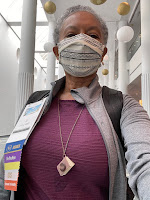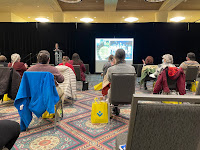This year, the
New York Library Association held its annual conference in both virtual (Oct. 28-29) and in-person (Nov. 3-6) formats, as well as having on-demand content. Below are notes from one of the virtual sessions.
Description
In this session, we will discuss a variety of employment law topics
and the laws that govern them. Topics will include hiring and firing of
employees, paid leave laws and policies, employee misconduct,
discrimination and harassment, interpersonal conflict and bullying, wage
and hour concerns, performance issues, safety concerns, and more. Using
real world scenarios that arise in libraries, we will identify legal
issues and plan practical approaches to resolving personnel problems. We
will examine how federal and state employment laws and library policy
work together, with a special focus on the requirements imposed by new
legislation and recent court decisions.
Presenters
- Ellen M. Bach, Whiteman Osterman & Hanna LLP
- Robert T. Schofield, Whiteman Osterman & Hanna LLP
Notes
Bach & Schofield used hypothetical situations during this session. You will notice many questions below and not always a "do this." Also I was taking notes quickly, so there could be other laws which apply in these scenarios.
Hypothetical #1: Yes, the position sounds great...can I do it from home? The person has a child who learns from home virtually on some days.
Do you have an obligation under current law to hire this person and allow the person to work from home? Families First Coronavirus Response Act (FSCRA)? Not currently. NYS COVID leave law? But this is only during a quarantine or something else that sends the person home. And that is not remote work, but is paid leave.
But what if they ask was about accessibility and accommodations, and the person has documentation to support them working from home part-time? That changes the analysis. ADA (Americans with Disabilities Act) and NYS Human Rights Law would cause you to engage with the person and see what is possible for that person to work from home.
What if the person's job is being done virtually, e.g., someone doing children's programming? How does that change the scenario for you?
Can you pay a bonus to help the person cover the cost of childcare, so the person will work in the office full-time? This would not be a gift, but paying something to get something. A gift would be illegal for libraries who are receiving public funds.
Family and Medical Leave Act (FMLA) policies apply to large association libraries (over 50 employees). FMLA applies to pubic libraries, but there are more technicalities. Take to HR or your attorney before you implement a policy.
A relevant opinion from the NYS Comptroller's Office is 91-32. It is not about a library, but Bob Schofield referenced it.
Hypothetical #2: Can't we just make the employee "on leave," leave?
What laws apply?
- Family and Medical Leave Act
- Americans with Disabilities Act
- NYS Human Rights Law
- Workers Compensation?
- Civil Service?
Is there a part for discipline? Is there a pathway towards a disability? You need to talk directly to the employee. If the person will not talk with you, you need to send a letter and know that it has been received. Explain that the employee has been out without a basis for the absence. Establish that the person needs to have a conversation with you. If the person does not talk with you and does not respond, you can send a follow-up letter with what the discipline is.
You might want the employee to talk with their doctor, with their job description in hand, to determine what accommodation the person needs in order to do their job.
Hypothetical #3: Go sleep at home...and don't come back? An employee seems to be sleeping at work and may have a mental health condition for which the person is taking medication.
Sleeping on a job - in a perfect world - is a fire-able offense. You would need to document the occurrences, as well as have counseled and disciplined the employee. You need written warnings and perhaps a last chance warning.
However, here there is rumor of a mental health condition. Is the condition or the medication causing the employee to fall asleep? Don't assume a disability, but also don't hide your head in the sand. If you seem to know that there is a disability, the court will take that into account.
What laws apply?
- Family and Medical Leave Act
- Americans with Disabilities Act
- NYS Disability?
- Civil Service?
A disability issue is a big issue. Mental health and substance abuse issues are becoming a large part of Bach and Schofield's practice.
Do not second guess medical professionals. You may need to ask additional questions, but don't assume the role of a doctor.
Question: We are an association library and are considering a retroactive raise
this year at the end of the year. We also considering an equivalent of
a week's pay at the end of the year. Are these OK? They are funded by a 414 levy.
If they were not publicly funded, this would be fine. Private employers do this!
If it is a public library, you do not want to make a retroactive gift. You could make a longevity bonus, because you would get something (longevity) for the gift.
The Comptroller does recognize that retroactive raise as the result of a collective bargaining settlement is fine.
Hiring Considerations:
- Think about the basic discrimination statutes.
- Consider blind reviews of resumes.
- Do not ask for medical, conviction, or salary history.
- Be careful with background sheets. Get all of the right consents.
- Be careful of asking questions that try to get at protected information in a round about why.
- Focus on the person's experience, etc.
- A person may volunteer information.
Hypothetical #4: The protected poor performer...
If a person has voiced concerns about the workplace (harassment, etc.), the library director should have someone look into these allegations. It should be an outsider who is skilled in handling these matters.
If two employees are not getting along, is there something that is actionable? An investigator may find there is none.
Be careful that you do not overlook discriminatory circumstances.
What laws apply?
- Title VII of the Civil Rights Act?
- New York State Human Rights Law?
- National Labor Relations Act
- Education Law 226(7)
Communications through social media may be protected activities. The posts may be annoying, but you may not be able to do anything about it.
Employees need multiple places to report concerns, because the director might be the harasser or a friend of a harasser. A claim a discrimination made to the trustees needs to be given to someone who can dig into it.
Question: Can you elaborate more on when and how you can do background checks?
If you are going to do a background check, you need to receive consent from the employee. If you are going to use the information, perhaps not to hire the employee, you need to give the employee an opportunity to correct the information.
There are positions in libraries where you might want to do a background check. You should do it after you have made a hiring decision. Make a conditional offer and then do the background check. Does the nature of the conviction have a nexus with the requirements for the job?
Corrections Law and Human Rights Law comes into play.
Question: I have a plot twist with the association library wishing to pay retroactive raises or end of year additional week pay. The funds we would like to use this year are from the PPP/Cares Act grant from the federal government. This is the Paycheck Protection Program. Would this be allowed?
Perhaps. Schofield would want to talk in detail with the client, to ensure that the money is segregated.




